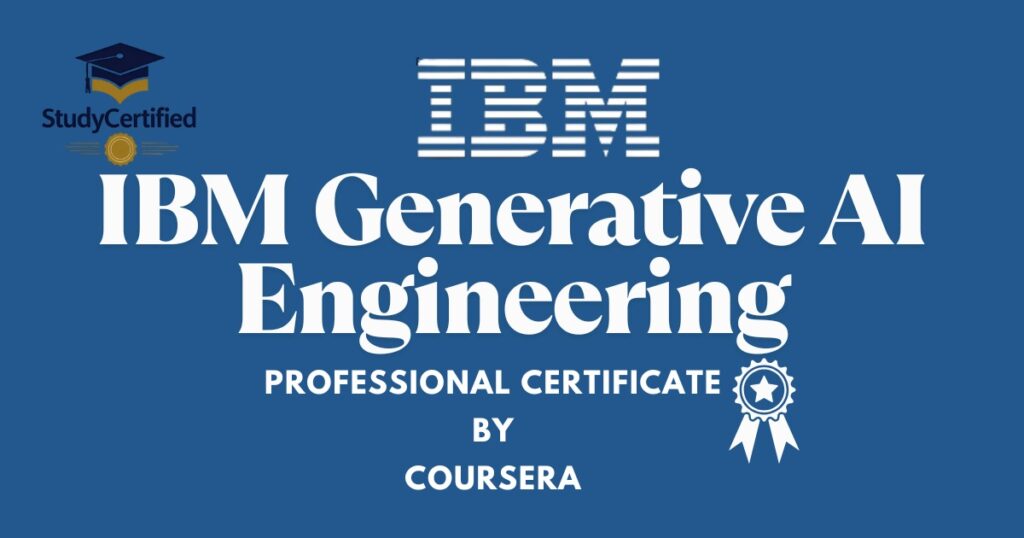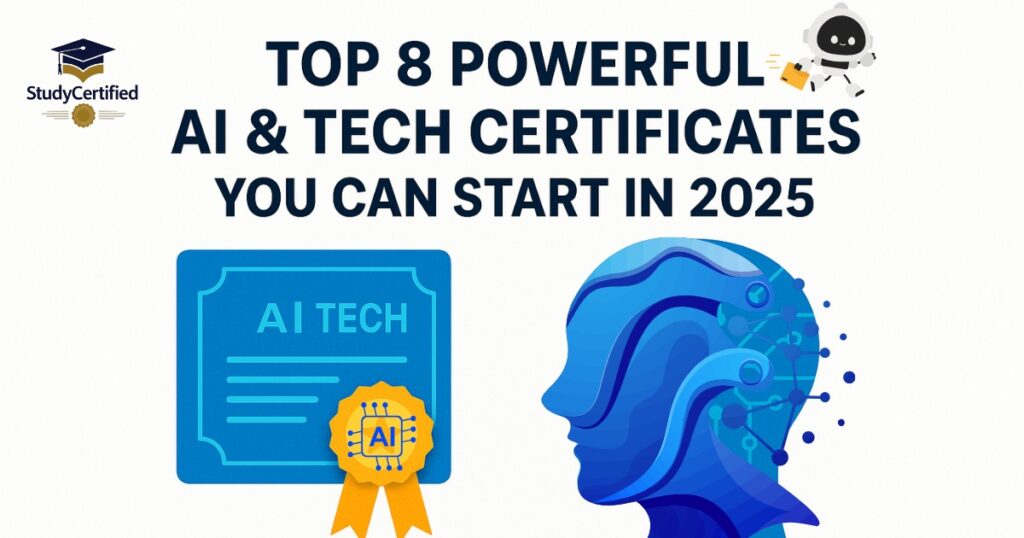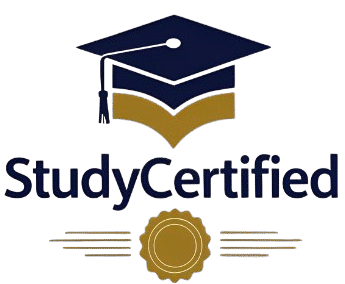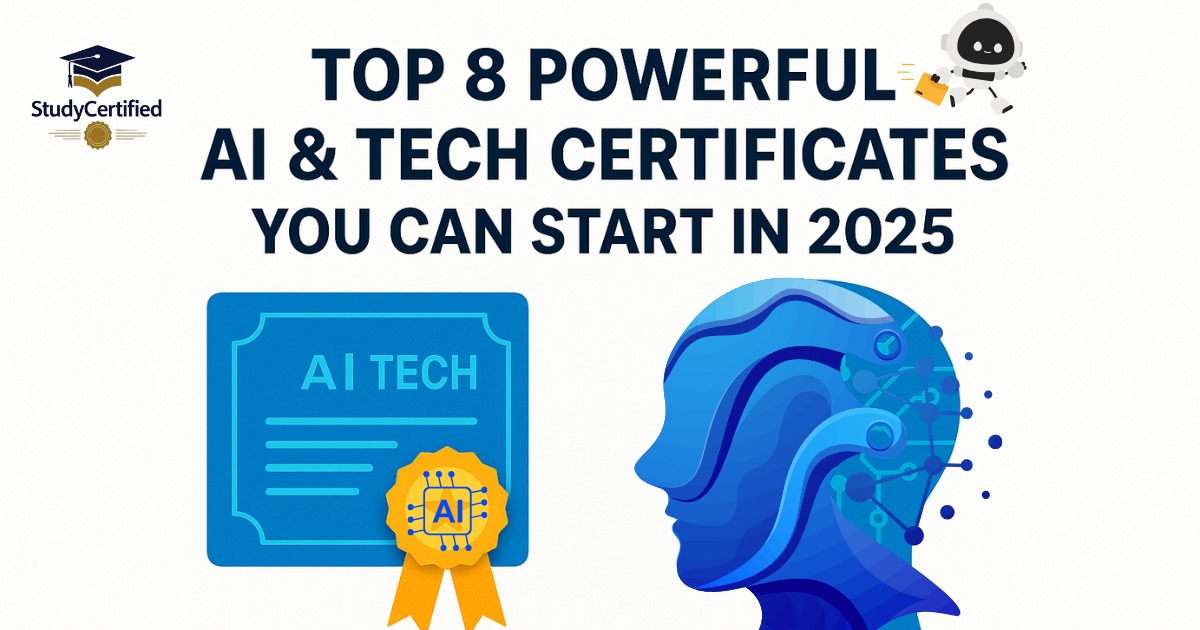Artificial intelligence (AI) is now a must-have skill for anyone in tech, business, or data-driven fields. Whether you’re just starting or looking to grow in your career, these top 8 AI and tech certifications in 2025 can help you build real, job-ready skills. From machine learning and data analytics to responsible AI governance, these programs offer structured paths for professionals at every level.
With organizations demanding practical AI talent, these top 8 certificates offer structured learning paths to help you build, deploy, and manage intelligent systems. Whether you’re a beginner, an engineer, or a business strategist, the right AI certification can help you future-proof your career and boost your job opportunities in 2025. These certifications will help you master Advanced topics such as machine learning models, natural language processing, AI frameworks, deep learning, data analytics, cloud AI deployment, and responsible AI governance.
Quick Comparison Table: Top AI Certifications for 2025
| Certification | Duration | Platform | Cost | Best For |
| Google AI Essentials | <10 hours | Coursera | $49 | Beginners & non-tech professionals |
| AWS Cloud Institute | 9 months | AWS | Grant-supported | Developers & cloud engineers |
| Microsoft Applied Skills | 2–4 hours (micro-courses) | Microsoft Learn | Varies | IT pros, analysts, upskillers |
| IBM Generative AI Engineering | 6 months | Coursera | Subscription ($59/month) | Engineers & developers |
| IAPP AI Governance | Self-paced + exam | IAPP | Standard fees | Ethics & compliance leaders |
| ADP Comp & Benefits Analyst | 2 months | Coursera | Subscription | HR and business ops pros |
| Ohio Semiconductor Tech | Varies | Colleges + Intel | Grant-supported | Technicians & STEM grads |
1. Google AI Essentials – Learn AI Without the Complexity
Best for: Beginners and marketers exploring AI
This easy-to-follow course explains AI concepts using simple examples—no coding skills needed. Hosted on Coursera and built by Google, it offers a foundational understanding of how AI impacts business, products, and user experience.
- Focus Areas: AI basics, prompt design, generative AI overview
- Duration: <10 hours
- Cost: $49 (scholarships available)
- Skills Gained: AI principles, application design, business relevance, AI literacy, automation trends
2. AWS Cloud Institute – Build AI in the Cloud
Best for: Cloud-native developers and tech pros
Designed for professionals ready to build end-to-end AI solutions, AWS Cloud Institute’s full-time program delivers real skills in cloud-based ML, data engineering, and deployment.
- Focus Areas: AI/ML on AWS, cloud architecture, Python
- Duration: 9 months full-time
- Cost: Grants and discounts available
- Skills Gained: Scalable AI deployment, serverless ML workflows, real-world AWS tools, AI DevOps, model deployment pipelines
3. Microsoft Applied Skills Micro-Credentials
Best for: Busy professionals who want fast validation
With each course taking just 2–4 hours, these Microsoft micro-credentials target specific AI tasks, such as text generation, computer vision, or bot building. A great option if you want to upskill quickly.
- Focus Areas: Azure AI services, applied projects
- Duration: 2–4 hours per micro-course
- Cost: Free and paid tracks
- Skills Gained: Azure AI usage, NLP, AI integration, rapid prototyping
4. IBM Generative AI Engineering Certificate
Best for: Engineers seeking deep generative AI experience
IBM’s Coursera-based program takes you through 16 modules focusing on deep learning, transformers, PyTorch, and more. Projects include using AI to build chatbots, generate text, and apply neural networks to real business cases.
- Focus Areas: Deep learning, LLMs, LangChain, model tuning
- Duration: ~6 months, 10–12 hrs/week
- Cost: $59/month Coursera subscription
- Skills Gained: PyTorch, transformer models, project-based mastery, AI application development, neural networks

5. IAPP AI Governance Professional Certificate
Best for: Compliance, ethics, and legal professionals
As AI expands, ethical and legal oversight becomes essential. This certification from IAPP (International Association of Privacy Professionals) provides frameworks for responsible AI deployment, risk management, and governance.
- Focus Areas: Privacy laws, AI ethics, audit compliance
- Duration: Self-paced + 3-hour exam
- Cost: Varies by membership and location
- Skills Gained: AI governance, policy creation, legal frameworks, responsible AI, AI risk mitigation
6. ADP Compensation & Benefits Analyst Certificate
Best for: HR professionals using AI for workforce planning
This Coursera-based program teaches HR pros how to apply data analytics and AI in planning compensation, forecasting benefits, and streamlining operational decisions.
- Focus Areas: HR analytics, predictive modeling, AI in people ops
- Duration: 2 months
- Cost: Coursera subscription
- Skills Gained: Data-driven compensation modeling, forecasting, HR tech, predictive workforce planning
7. Ohio Semiconductor Technician Pathway
Best for: Tech grads and semiconductor technicians
In collaboration with Intel, this certification trains students and STEM professionals for AI-adjacent manufacturing roles in the semiconductor industry — a vital growth sector in 2025.
- Focus Areas: Semiconductor systems, manufacturing automation, AI integration
- Duration: Varies by institution
- Cost: Often grant-supported
- Skills Gained: AI-augmented hardware, systems testing, process optimization, edge computing, embedded AI
8. DeepLearning.AI – AI For Everyone
Best for: Non-technical leaders and business strategists
Led by Andrew Ng, this course helps non-engineers understand how AI creates value, what it can/cannot do, and how to lead AI projects in real-world companies.
- Focus Areas: AI strategy, ethics, project leadership
- Duration: 6 hours
- Cost: $59/month on Coursera
- Skills Gained: AI implementation strategies, stakeholder communication, AI use cases, business transformation
Beginner vs Advanced: Which Certificate Should You Choose?
| Profile | Recommended Certification |
| No coding background | DeepLearning.AI – AI For Everyone |
| A developer building AI apps | IBM Generative AI Engineering or AWS Cloud Institute |
| Project/HR Manager | ADP Compensation Certificate or IAPP AI Governance |
| Executive leader or strategist | Google AI Essentials or USAII CAITL (external) |
| Cloud specialist | Microsoft Applied Skills or Azure AI Engineer (add-on) |
What Jobs & Salaries Can You Expect Post-Certification?
| Job Role | Average U.S. Salary (2025) |
| AI Engineer | $130,000+ |
| ML Engineer | $120,000+ |
| Data Scientist (AI Focus) | $115,000+ |
| Generative AI Product Owner | $135,000+ |
| AI Compliance Lead | $110,000+ |
Source: Glassdoor, LinkedIn Jobs, Coursera Skills Reports (2024-2025)
These roles require familiarity with large language models (LLMs), AI pipelines, data preprocessing, and real-time AI tools — all covered in the certifications above.

Final Thoughts: Build Your AI-Ready Career Today
Whether you’re in tech or just curious about AI, there’s a course that fits your path. These certifications can boost your confidence, open new job doors, and keep you relevant in a fast-changing world. Pick one that fits your time, budget, and goals—and start learning today.
Choose your path, commit to learning, and start transforming your career with skills that matter in 2025 and beyond.
Ready to start? Explore these AI certification programs on Coursera, edX, Google Cloud, or AWS Training.
Have questions? Drop them in the comments or reach out for a personalized recommendation!
FQAS
Q: Will AI replace jobs in 2025?
Answer:
AI will automate certain tasks, especially repetitive or data-driven ones. However, it’s more likely to transform jobs than fully replace them. Roles in customer service, data entry, and logistics may see automation, but new jobs will emerge in AI development, ethics, data science, and human-AI collaboration. Upskilling through AI certifications can help you stay relevant.
Q:What are the best AI certifications to get?
Answer: Some top options this year include:
- Google AI Essentials – beginner-friendly
- IBM Generative AI Engineering – great for developers
- AWS Cloud Institute – ideal for cloud-native AI skills
- IAPP AI Governance – best for legal/ethics roles
Each focuses on practical, job-relevant skills.
Q: What career will AI replace?
Answer:
AI is likely to replace careers that involve repetitive, rules-based tasks. This includes jobs in data entry, telemarketing, basic customer support, and some manufacturing roles. However, careers that require creativity, emotional intelligence, strategic thinking, or deep expertise are expected to evolve rather than disappear.
Q: Where will AI be in 10 years?
Answer:
By 2035, AI will be deeply integrated into healthcare, education, finance, and transportation. We can expect more autonomous systems, smarter virtual assistants, widespread use of generative AI, and stronger emphasis on AI regulation and ethics. Human-AI collaboration will be the norm in most workplaces.
Q: What are the AI predictions for 2025?
Answer:
In 2025, AI will be more accessible, with tools for both technical and non-technical users. Key predictions include:
- A surge in generative AI adoption
- Growth in AI-related job roles
- Tighter focus on AI ethics and governance
- Expansion of cloud-based AI platforms
- Increased demand for AI certifications and reskilling
Getting certified now can place you at the forefront of this AI-driven transformation.

I am an Assistant Professor at UCSC with a background as a Postdoctoral Scholar in Environmental Policy, Science, and Management at UC Berkeley. My research centers on soil biophysiochemical processes and nitrogen cycling, aimed at mitigating agriculture’s environmental footprint. I hold a PhD and MS in Soils and Biogeochemistry from UC Davis, where I received the DOE Office of Science Graduate Student Research award. My work combines field investigations, laboratory experiments, and modeling. Additionally, I have provided international consulting on soil remediation. I earned a BA in Mathematics from Bryn Mawr College and previously contributed to the University of Delaware’s Environmental Soil Management Group.

